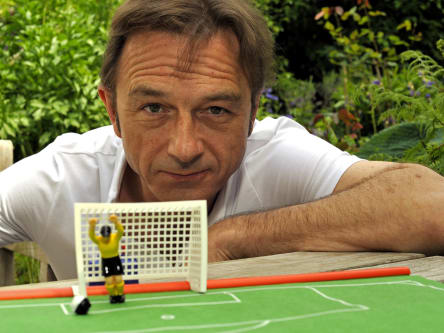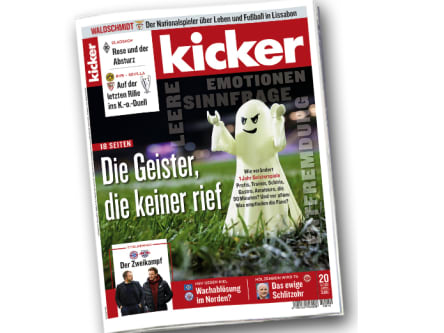The ranks are empty. Football is reduced to its essence. Many fans are torn inside. A year of ghost games: what did they do? And how great has the emotional alienation become for fans and players?
Union keeper Andreas Luthe misses the “common suffering with the fans”.
imago images
–
Not everything is different in these times, but a lot. And for the professionals at SC Freiburg, that starts with the immediate game preparation. In contrast to the home games before the pandemic, Nils Petersen and his colleagues sit together in the hotel for a few hours to create a competitive feeling. “But then we take the team bus to the stadium and people don’t really care,” said the striker, describing his feelings in an interview with kicker, which focuses on a total of 18 pages on the subject of “A year of ghost games” in the Monday edition. “I used to see 20 flags and 48 jerseys at Littenweiler train station at half past eleven near the stadium. Then you knew: Today you can make people happy! Of course the fans at home cheer us now, but we don’t notice. ”
Like training games: Freiburg’s Nils Petersen.
imaogo images
Jena, Cottbus, Bavaria, Bremen, Freiburg. Nils Petersen made his goals everywhere; 17 in 29 appearances in the DFB-Pokal, 60 in 110 second division games and 82 hits in 236 appearances in the Bundesliga. The 32-year-old has seen a lot, he only knew goals without real cheers – until Corona came. Even after his 1-0 winner against Gladbach he felt emptiness, “because the feeling after a home goal with all those happy faces is indescribable. When I look at my future wife and friends in the stands and see them turn away, there is driving a shiver of happiness through my body and I feel real vibrations in the stadium “.
It feels like a training game at times.
He has had to do without this feedback for a year. So far, Stuttgart has seen the last regular backdrop at national level. 54,307 fans on a Monday evening at the top game in the 2nd division between VfB and Arminia Bielefeld. That was exactly a year ago on Tuesday of this week. The first ghost game took place on March 11, 2020: Mönchengladbach against Cologne. Without fans it is of course difficult to create competition tension. “I hate that feeling of excitement, nervousness, stomach ache, you go to the toilet three times and sweat a lot, that’s uncomfortable,” says Petersen, describing his inner restlessness before games when the tiers are full. “It’s all a little less now because there is no direct feedback from people. It sometimes feels like a training game.”
Andreas Luthe was a first grader when his father took him to a professional game for the first time in the stadium. “That never let go of me,” emphasizes the Union Berlin goalkeeper, “if you experience a full stadium as a child, you want to be down there on the field at some point. That drives you.” That’s exactly what Luthe did. But football in Corona times no longer has much in common with that feeling from childhood. “Our sport has become cool. Objective,” the 33-year-old sums up in his column for kicker. “It is underestimated how much the players miss the spectators. When you stand in front of the curve after a win and celebrate with the fans or go to the fence after a defeat and discuss the shitty situation with them – all of that is missing. ”
It is underestimated how much the players miss the audience.
Like Petersen, Luthe is one of the most opinionated and reflective professionals in the industry. The keeper sits for the players ‘union VDV and the players’ alliance, which he co-founded, in the DFL’s “Future of Professional Football” task force. “Most of the players I know get very close when things don’t go well. Suffering together with the fans shapes and bonds together. But at the moment I find it difficult to assess what opinion is out there about our sport.”
Fan Fritz Eckenga is missing the “partying, mourning, talking nonsense”
BVB fan and cabaret artist Fritz Eckenga.
imago images
Fritz Eckenga can serve with what the fans out there think of the professionals in there. He has been a season ticket holder with BVB since the 80s. At first he stood on the south, and when he felt too old for that, he moved to the west stand, block 33. The 66-year-old football lover cannot do anything with ghost games, he lacks the “energy that goes through the stadium” “and the” feeling of being able to influence the game “above all” the community experience: meeting friends, meeting in the pub well before kick-off and eating afterwards. The partying, the mourning, the nonsense “.
If a lot of what is essential to me is now taken away from me, the question of meaning becomes increasingly clear to me.
But it’s not just what has been spoiling the fun of football since the introduction of the ghost games. What bothers him extremely is “this professional football business”. In the “reduced form” it becomes clear: “The only goal is to maintain the business economically in some way and to make a profit. That is all that matters.” Corona did not change football. But “when the focus is so focused on that, the balancing act that I have already done in normal times, namely giving up my mind at the stadium cloakroom, gets bigger and bigger,” he explains.
For Eckenga, football is part of his life and his life story, “I can’t do without it. But I’m not so naive as to be able to ignore everything else. This business, these huge sums of money that are being implemented. If I can do a lot now When what is essential for me is taken away, the question of meaning arises more and more clearly for me. Sometimes I ask myself how this balancing act can still be endured “.
One year of ghost games – the big kicker cover story in the Monday edition.
kicker
The ghosts that nobody called – in the kicker Monday edition (also available as an eMagazine) we look back on a year of ghost games on a total of 18 pages. What has changed for professionals, coaches, referees, gastro, amateurs and the 90 minutes? And above all: How do the fans feel? Andreas Luthe, Nils Petersen, Frank Schmidt, Manuel Gräfe, young and older fans, stadium announcer Arnd Zeigler, radio reporter Stephan Kaußen, RWO President Hajo Sommers, snack operator Kanniah Jeyakaran will talk about this.





